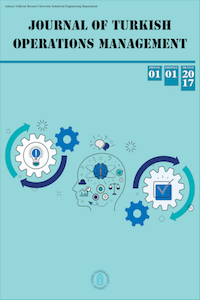ENDÜSTRİ MÜHENDİSLİĞİ PERSPEKTİFİNDEN AKILLI ULAŞIM SİSTEMLERİ ÜZERİNE SİSTEMATİK BİR LİTERATÜR TARAMASI
Akıllı şehirler, sakinlerini dijital topluluklara dönüştüren ve onların hayatını her yönden kolaylaştıran bir anlayışıyla hızla gelişmektedir. Akıllı şehirlerin en önemli parçası olan akıllı ulaşım sistemleri (AUS), herkesin vazgeçilmez bir parçası haline geliyor. AUS uygulamaları bugün birçok ülkede yaygın olarak kabul görmekte ve kullanılmaktadır. Kullanım yalnızca trafik sıkışıklığı kontrolü ve bilgileri ile sınırlı değildir, aynı zamanda yol güvenliği ve verimli altyapı kullanımı da ana amaçlar arasındadır. Sunmuş olduğu sınırsız fırsatlar nedeniyle, AUS günümüzde çok disiplinli bir konjonktürel çalışma alanı haline geldi ve bilim dünyasından da yoğun bir ilgi görmüştür. Bu açıdan endüstri mühendisleri için de AUS uygulamalarının geliştirilmesinde özellikle optimizasyon ve simülasyon açısından önemli fırsatlar bulunmaktadır. Ayrıca AUS sistemlerinin bir sistem yaklaşımı içinde geliştirilmesi de yine tasarım açısından endüstri mühendisliği ilgi alanına girmektedir. Bu çalışmanın amacı AUS ile ilgili yapılmış olan çalışmaları Endüstri Mühendisliği perspektifinden sistematik bir şekilde inceleyip konuya ilgi duyan araştırmacılara konu ile ilgili genel resmi göstermektir
Anahtar Kelimeler:
akıllı ulaşım sistemleri, endüstri mühendisliği, simülasyon, optimizasyon
A SYSTEMATIC LITERATURE REVIEW ON INTELLIGENT TRANSPORTATION SYSTEMS FROM AN INDUSTRIAL ENGINEERING PERSPECTIVE
Smart cities are developing rapidly with an understanding that transforms their inhabitants into digital communities and makes their lives easier in several aspects. Intelligent transportation systems (ITS), which is the most important part of smart cities, are becoming an indispensable part of everyone. ITS applications are widely accepted and used in many countries today. Usage is not limited to traffic congestion control and information, but also road safety and efficient infrastructure use are among the main objectives. Due to the unlimited opportunities it offers, ITS has become a multidisciplinary field of study and has received a lot of attention from the scientific community. In this respect, there are important opportunities for industrial engineers in the development of ITS applications, especially in terms of optimization and simulation. In addition, industrial engineers deal with the development of ITS design using a system design perspective. The aim of this study is to examine systematically the studies related to ITS from the Industrial Engineering perspective and to show the general picture to the interested researchers.
___
- [1] Carley W. A., “Railroads test satellite positioning in effort to improve safety, efficiency”, The Wall Street Journal Interactive Edition, 29, (1998)
- [2] Siddaway A., “What is a systematic literature review and how do I do one”, University of Stirling, I:1, (2014)
- [3] Bem D. J., “Writing a review article for Psychological Bulletin”, Psychological Bulletin, 118: 172–177, (1995)
- [4] Cooper H. M., “Editorial”, Psychological Bulletin, 129: 3-9, (2003)
- [5] Baumeister R. F., Leary M. R., “Writing narrative literature reviews”, Review of General Psychology, 3: 311–320, (1997)
- [6] Baumeister R. F., “Writing a literature review”, In M. J. Prinstein & M. D. Patterson (Eds.),. In The portable mentor: Expert guide to a successful career in psychology (2nd ed., pp. 119–132). New York: Springer Science+ Business Media, (2013)
- [7] Diakaki C., Papageorgiou M., Dinopoulou V., Papamichail I., Malandraki G., “State-of-the-art and -practice review of public transport priority strategies”, IET Intel. Transport Syst., 9: 391–406, (2015)
- [8] Butakov V., Ioannou P., “Driving Autopilot with Personalization Feature for Improved Safety and Comfort”, IEEE Conference on Intelligent Transportation Systems Proceedings, ITSC, 387–393, (2015)
- [9] Maimaris A., Papageorgiou G., “A Review of Intelligent Transportation Systems from a Communications Technology Perspective”, IEEE 19th International Conference on Intelligent Transportation Systems (ITSC) (November 2016), https://doi.org/10.1109/ITSC.2016.7795531, (2017)
- [10] Yang Y., Bagrodia R., “Evaluation of VANET based advanced intelligent transportation systems”, VehiculAr InterNETworking VANET, Sixth ACM international workshop, (2009)
- [11] Cobo M. J., Chiclana F., Collop A., Ona J. De, Herrera-Viedma E., “A bibliometric analysis of the intelligent transportation systems research based on science mapping”, IEEE Trans. Intell. Transp. Syst., 15(2): 901–908 (2014)
- [12] Feteiha M. F., Hassanein H. S., “Enabling cooperative relaying vanet clouds over LTE-A networks”, IEEE Trans. Veh. Technol., 64(4): 1468–1479, (2015)
- [13] Abdel-rahim A., “Intelligent Transportation Systems”, Janeza Trdine 9, 51000 Rijeka, Croatia: InTech, (2012)
- [14] Güven A.C., “Endüstri Mühendisliği Perspektifinden Akıllı Ulaşım Sistemleri Üzerine Bir Sistematik Literatür Taraması”, Yüksek Lisans Tezi, Başkent Üniversitesi Fen Bilimleri Enstitüsü, Ankara, (2019)
- [15] Gallo M., D’Acierno L., Montella B., “Global Optimisation of Signal Settings: Meta-Heuristic Algorithms for Solving Real-Scale Problems”, In Computer-based Modelling and Optimization in Transportation, Springer Cham Heidelberg New York Dordrecht London, (2014)
- [16] Maia L. C., Couto A. F., “A Rail Network Optimization Model Designed for Freight Traffic”, In Computer-based Modelling and Optimization in Transportation, Springer Cham Heidelberg New York Dordrecht London, (2014)
- [17] Gomes R., Sousa J. P., Galvão T., “An Integrated Approach for the Design of Demand Responsive Transportation Services”, In Computer-based Modelling and Optimization in Transportation, Springer Cham Heidelberg New York Dordrecht London, (2014)
- [18] Reyes A., Romero L. M., Benitez F. G., “Bilevel O/D Matrix Adjustment Formulation Using High Convergence Assignment Methods”, In Computer-based Modelling and Optimization in Transportation, Springer Cham Heidelberg New York Dordrecht London, (2014)
- [19] Shah N., Kumar S., Bastani F., Yen I.-L., “Optimization models for assessing the peak capacity utilization of intelligent transportation systems”, European Journal of Operational Research, 216: 239–25, (2011)
- [20] Agatz N., Erera A., Savelsbergh M., Wang X., “Optimization for dynamic ride-sharing: A review”, European Journal of Operational Research, 223: 295–303, (2012)
- ISSN: 2630-6433
- Başlangıç: 2017
- Yayıncı: Ankara Yıldırım Beyazıt Üniversitesi
Sayıdaki Diğer Makaleler
OTEL SEÇİMLİ GEZGİN SATICI PROBLEMİ İÇİN DEĞİŞKEN KOMŞU İNİŞ SEZGİSELİ
İpek Damla AKPINAR, Barış KEÇECİ
CAM ENDÜSTRİSİNDE HEDEF PROGRAMLAMA İLE ERGONOMİK PERSONEL ÇİZELGELEME PROBLEMİ
Safiye Özlem KAÇMAZ, Hacı Mehmet ALAKAŞ, Tamer EREN
Muhammet YORULMAZ, Gülin Feryal CAN
